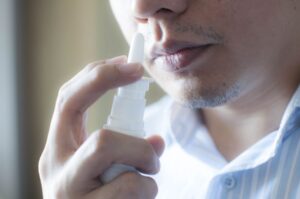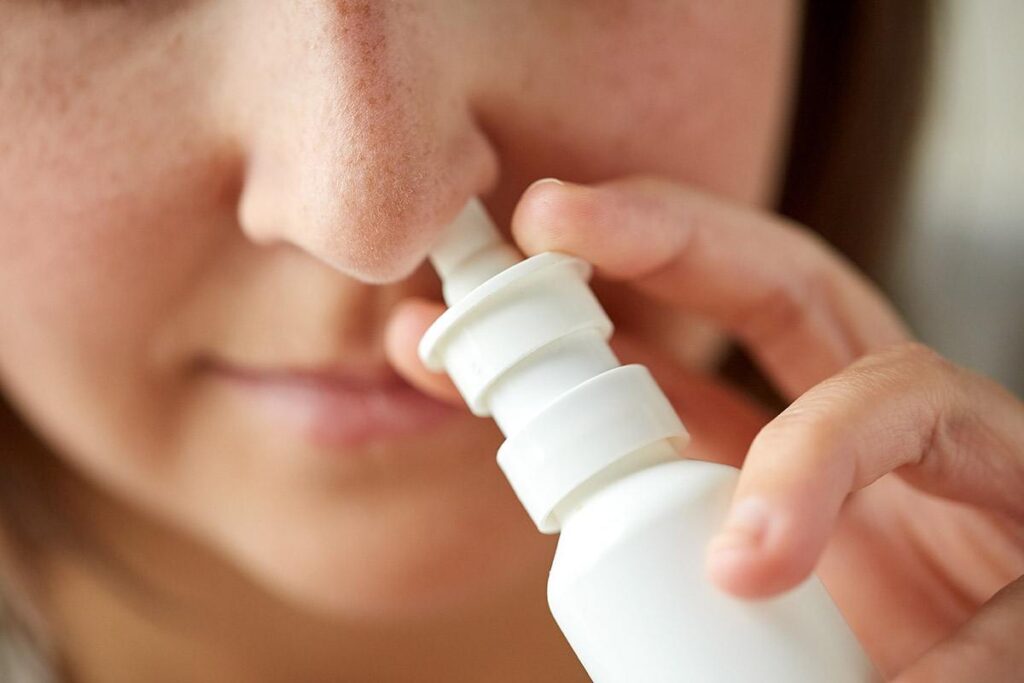Nasal spray addiction, often overlooked, can be a daunting challenge for those affected. What may start as a simple remedy for congestion can quickly spiral into dependency, leading to a host of physical and psychological struggles. In this blog, we’ll delve into the intricacies of nasal spray addiction, exploring its causes, symptoms, and most importantly, strategies for overcoming it and reclaiming control of your health.
Contents
Are Nasal Sprays Addictive?
 While nasal sprays themselves are not inherently addictive, certain types of nasal sprays, particularly those containing decongestants such as oxymetazoline or pseudoephedrine, can lead to dependency. And this happens when used excessively or for prolonged periods.
While nasal sprays themselves are not inherently addictive, certain types of nasal sprays, particularly those containing decongestants such as oxymetazoline or pseudoephedrine, can lead to dependency. And this happens when used excessively or for prolonged periods.
However, frequent use beyond the recommended duration can cause the nasal tissues to become reliant on the spray for normal function. And, leading to a condition known as rebound congestion or rhinitis medicamentosa. Individuals may then feel the need to use the nasal spray more frequently to alleviate symptoms, perpetuating a cycle of dependency.
It’s important to use nasal sprays as directed and for the shortest duration necessary to avoid the risk of dependency. If you find yourself needing to use a nasal spray regularly for an extended period or experiencing worsening congestion when attempting to stop, it’s crucial to seek medical advice.
What Happens When You Use Nasal Spray Too Much?
Using nasal spray too much, especially over an extended period, can lead to a condition called rebound congestion or rhinitis medicamentosa. This occurs when the blood vessels in the nasal passages become accustomed to the medication in the spray and begin to swell excessively when the spray wears off. As a result, the congestion worsens, leading individuals to use the nasal spray more frequently to relieve symptoms.
Continued overuse of nasal spray can also lead to other negative effects, including:
- damage to the delicate tissues lining the nasal passages
- increased risk of nasal infections
- potential systemic side effects if the medication is absorbed into the bloodstream
Additionally, excessive reliance on nasal spray can mask underlying issues such as allergies or sinus infections, preventing proper diagnosis and treatment. Therefore, it’s essential to use the nasal spray as directed and for the shortest duration necessary to avoid these complications.
What Are The Symptoms Of Nasal Spray Addiction?
 Symptoms of nasal spray addiction typically manifest as a worsening of nasal congestion and related symptoms despite continued use of the nasal spray. These symptoms may include:
Symptoms of nasal spray addiction typically manifest as a worsening of nasal congestion and related symptoms despite continued use of the nasal spray. These symptoms may include:
- Increased nasal congestion: Despite using nasal spray regularly, individuals may experience worsening congestion over time, leading to a persistent feeling of stuffiness in the nose.
- Difficulty breathing through the nose: As congestion worsens, it may become increasingly challenging to breathe through the nose, particularly at night or during physical activity.
- Nasal irritation and dryness: Continued use of nasal spray can irritate the delicate tissues lining the nasal passages, leading to dryness, discomfort, and even nosebleeds.
- Decreased sense of smell and taste: Prolonged congestion and irritation can affect the sense of smell and taste, making it difficult to enjoy food or detect odors.
- Headaches: Nasal congestion and irritation may contribute to frequent headaches or facial pain, particularly around the forehead, cheeks, or eyes.
- Insomnia or disrupted sleep: Nasal congestion can interfere with breathing during sleep. Hence, leading to snoring, sleep apnea, or difficulty getting restful sleep.
- Anxiety or distress: The cycle of dependence on nasal spray and worsening symptoms can cause emotional distress, anxiety, or frustration, impacting overall quality of life.
If you experience these symptoms despite using nasal spray regularly, it’s essential to seek medical advice to address the underlying issue and develop a plan for discontinuing the spray safely.
How Much is The Overuse of Nasal Spray?
Overuse of nasal spray refers to using it beyond the recommended dosage or duration specified by healthcare professionals or indicated on the product label. Generally, nasal sprays containing decongestants, such as oxymetazoline or pseudoephedrine, should not be used for more than three to five consecutive days. This limitation is to prevent the development of rebound congestion.
If nasal spray is used for longer than the recommended duration or if it is used more frequently than directed, it can lead to dependency, where the nasal tissues become reliant on the medication to function normally. Therefore, it’s essential to follow the instructions provided by healthcare professionals or on the product label carefully and to seek medical advice if you have concerns about prolonged or excessive use of nasal spray.
How To Stop Nasal Spray Addiction?
 Stopping nasal spray addiction, or rebound congestion caused by overuse of nasal spray, requires a systematic approach to gradually reduce dependence while managing withdrawal symptoms. Here are steps to consider:
Stopping nasal spray addiction, or rebound congestion caused by overuse of nasal spray, requires a systematic approach to gradually reduce dependence while managing withdrawal symptoms. Here are steps to consider:
Consult a healthcare professional
A healthcare provider, such as an ENT specialist or a primary care physician, can offer valuable insight into your nasal spray addiction and provide personalized guidance. They will assess your medical history, current symptoms, and nasal health to develop an appropriate treatment plan. Additionally, they can address any concerns or questions you may have about the recovery process.
Gradual tapering
Abruptly stopping nasal spray can exacerbate rebound congestion and withdrawal symptoms. Instead, your healthcare provider will create a tapering schedule that gradually reduces the frequency and dosage of nasal spray over time. This gradual approach helps your nasal tissues adjust to functioning without the medication while minimizing discomfort.
Switch to saline spray
Saline nasal spray provides moisture and relief to the nasal passages without the risk of rebound congestion. Your healthcare provider may recommend switching to saline spray during the tapering process to alleviate symptoms and support the transition away from medicated nasal sprays. Using saline spray regularly can help maintain nasal health and prevent future dependency on medicated sprays.
Address underlying issues
Nasal congestion can stem from various underlying issues such as allergies, sinus infections, or structural abnormalities. Addressing these underlying conditions is crucial for long-term recovery from nasal spray addiction. Your healthcare provider may recommend allergy testing, sinus imaging, or other diagnostic tests to identify and treat the root cause of your nasal congestion.
Manage withdrawal symptoms
As you taper off nasal spray, you may experience withdrawal symptoms such as increased congestion, discomfort, or difficulty breathing. Over-the-counter medications, such as oral decongestants or antihistamines, may help alleviate symptoms. Nasal irrigation with a saline solution, using a humidifier to add moisture to the air. And practicing nasal breathing exercises can also provide relief and support the healing process.
Seek emotional support
Coping with nasal spray addiction and the associated withdrawal symptoms can be emotionally challenging. Reach out to friends, family, or support groups for emotional support and encouragement. Talking to others who have experienced similar challenges can provide valuable insight, empathy, and motivation throughout your recovery journey.
Follow-up care
Regular follow-up appointments with your healthcare provider are essential for monitoring your progress and adjusting treatment plans as needed. Your healthcare provider will evaluate your nasal health, assess any lingering symptoms or concerns, and provide guidance on maintaining long-term nasal health. Open communication with your healthcare provider ensures that you receive the support and care necessary.
By following these steps and working closely with a healthcare provider, you can successfully overcome nasal spray addiction and reclaim control of your nasal health.
Conclusion
In conclusion, overcoming nasal spray addiction is a journey that requires patience, perseverance, and support. By working closely with healthcare professionals, gradually tapering off nasal spray, and addressing underlying issues contributing to nasal congestion, individuals can reclaim control of their nasal health and break free from dependency.
Switching to saline spray, managing withdrawal symptoms, and seeking emotional support from friends and family are essential components of the recovery process. With determination and dedication, it is possible to overcome nasal spray addiction and enjoy long-term nasal health and well-being.
